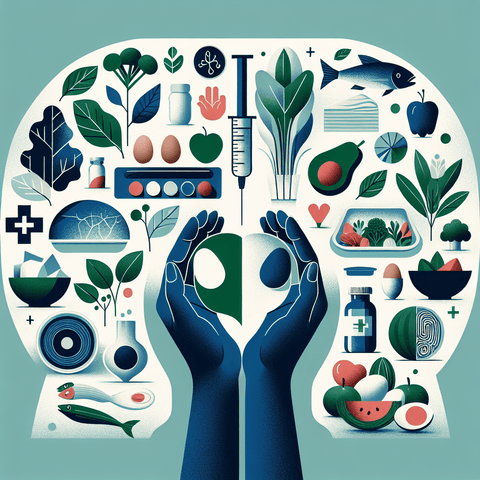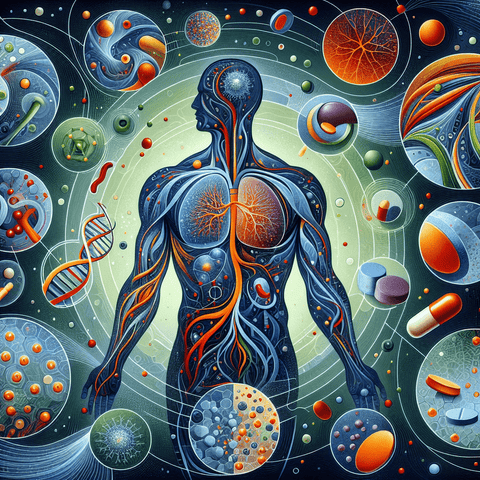Introduction
Vitamin B12, also known as cobalamin, is a vital nutrient that plays critical roles in DNA synthesis, red blood cell formation, neurological function, and overall cellular metabolism. Because it is primarily found in animal-based products, many people may inadvertently become deficient—especially those on plant-based diets or individuals with certain medical conditions that impair absorption. This deficiency doesn't just influence your energy levels; it can affect your brain health, immune strength, and long-term well-being.
Nutritional supplements have become increasingly important for managing and preventing vitamin B12 deficiency, particularly for at-risk populations. These include older adults, vegetarians or vegans, individuals with gastrointestinal disorders, and those who have undergone surgeries affecting the digestive tract.
This blog aims to guide you through the telltale signs of vitamin B12 deficiency and help you understand the causes, risk factors, methods of diagnosis, treatment options, and the supportive role of supplementation. With a growing range of targeted supplements and enhanced awareness, treating and preventing B12 deficiency is more achievable than ever. Recognizing the signs early can help avert irreversible damage and profoundly improve quality of life.
1. Understanding Vitamin B12 Deficiency and Its Significance in Nutritional Supplements
Vitamin B12 deficiency arises when the body doesn't have enough cobalamin to meet physiological needs. Essentially, this means either you aren’t consuming enough through your diet, or your body is unable to absorb it effectively. The condition can remain unnoticed for months or even years because symptoms often develop gradually.
Global Prevalence: Vitamin B12 deficiency is a worldwide concern. Studies estimate that around 6% of adults under age 60 in the US and UK are deficient. However, this figure rises to nearly 20% in people over the age of 60. In developing countries, deficiency rates can be even higher due to limited access to animal-based foods and fortified products.
Why Supplements Matter: To combat this, nutritional supplements can play a crucial role. There are several forms of vitamin B12 supplements available including:
- Methylcobalamin: A naturally occurring form of B12 that is preferred for better absorption and is active in human metabolism.
- Cyanocobalamin: A synthetic version commonly found in supplements; it gets converted into active forms in the body.
- B12 Injections: These are prescribed when absorption via the digestive tract is impaired due to medical conditions.
Understanding whether your deficiency is due to insufficient intake (common in vegan diets) or due to absorption issues (e.g., pernicious anemia or gastrointestinal disease) is key to choosing the appropriate supplement strategy.
Several quality nutritional B12 supplements are formulated to cater to different needs, including those with co-factors like folate and vitamin D. You can explore vitamin D products that pair well with B12 for immune and mood support.
2. Recognizing the Symptoms of Vitamin B12 Deficiency
Vitamin B12 deficiency manifests across both physical and neurological systems. The severity and variety of symptoms depend on how depleted your stores have become and the root cause of the deficiency.
Common Physical Symptoms:
- Persistent fatigue and weakness
- Pale or jaundiced skin
- Shortness of breath, especially upon exertion
- Dizziness or lightheadedness
- Swollen, red, or “beefy” tongue
Cognitive and Neurological Symptoms:
- Pins and needles sensation in hands and feet (paresthesia)
- Balance and coordination problems
- Forgetfulness and confusion
- Decline in mental clarity and cognitive speed
- Possible tremors or muscle weakness
Mental Health Impacts: Deficiency isn’t limited to physical symptoms. Low B12 levels have been associated with mood disorders including depression, irritability, and anxiety. In elderly individuals, unrecognized B12 deficiency can resemble early dementia or Alzheimer’s disease.
Anemia Related Signs: As B12 is essential in red blood cell production, deficiency often leads to megaloblastic anemia. This form of anemia results in larger-than-normal red blood cells that function poorly. Symptoms include breathlessness, heart palpitations, and a general inability to sustain energy levels.
If you notice any combination of the symptoms above—especially neurological ones—it’s essential to see a healthcare provider immediately. Early treatment can reverse most of the damage, but delayed therapy can result in permanent neurological deficits.
3. Causes of B12 Deficiency: Why Does It Occur?
Understanding the root causes of vitamin B12 deficiency helps in creating an effective recovery and prevention plan. Below are the leading reasons why people develop low B12 levels:
1. Inadequate Dietary Intake: This is most common among vegans and vegetarians, as vitamin B12 is naturally found only in animal-derived foods such as meat, dairy, eggs, and fish. Some fortified plant-based foods exist but may not be consumed in sufficient quantities.
2. Malabsorption: Even with an adequate diet, individuals may not properly absorb B12 due to underlying conditions:
- Pernicious Anemia: An autoimmune condition that damages stomach cells responsible for secreting intrinsic factor, a protein essential for B12 absorption.
- Crohn’s Disease and Celiac Disease: These conditions can damage the part of the intestine responsible for B12 absorption.
3. Age-Related Factors: As people age, stomach acid production diminishes, impairing the release of B12 from food sources. This condition, known as atrophic gastritis, is common in older adults.
4. Medications: Several drugs are known to interfere with B12 absorption including:
- Proton Pump Inhibitors (PPIs): These suppress stomach acid and hamper B12 release from food.
- Metformin: Commonly used by people with type 2 diabetes, this drug affects the intestinal uptake of B12.
5. Surgical Interventions: Individuals who’ve undergone gastric bypass surgery or had parts of their stomach or ileum removed may permanently lose their ability to absorb B12 naturally.
6. Other Rare Causes: These include hereditary disorders affecting transport proteins, heavy alcohol use, and long-term infections or inflammations.
4. How Is B12 Deficiency Diagnosed?
Diagnosing vitamin B12 deficiency involves a comprehensive analysis of medical history, dietary patterns, physical examination, and laboratory tests. A proper diagnosis is crucial to successful treatment.
Clinical Review and History: Doctors may begin by asking about dietary habits, existing medical conditions, medication use, and symptoms. Special attention is given if the individual follows a meat-free diet, is elderly, or has gastrointestinal issues.
Lab Testing:
- Serum B12 Level: A standard initial test that measures circulating B12 levels. Levels below 200 pg/mL typically indicate deficiency.
- Methylmalonic Acid (MMA): Elevated concentrations are a more sensitive marker of early vitamin B12 deficiency, particularly in asymptomatic individuals.
- Homocysteine: Raised levels indicate disrupted B12 activity, also seen in folate deficiencies.
Neurological Tests: If cognitive or motor symptoms are present, neurological testing may be advised. These could include nerve conduction studies or memory evaluations.
Other Tests: Although rarely used today, the Schilling test can help determine whether malabsorption is a cause of the deficiency.
Early diagnosis is essential, especially in cases involving nerve damage or mental changes. Irreversible damage can occur if the deficiency remains untreated over time.
5. Effective B12 Deficiency Treatments and Supplementation Strategies
Treatment varies based on the cause, severity, and symptoms. In many cases, the condition can be effectively managed with dietary changes and supplementation.
1. Dietary Sources: For those not severely deficient and capable of absorbing B12, eating more B12-rich foods such as liver, clams, red meat, eggs, and dairy can be beneficial. Fortified cereals and plant-based milks offer options for vegetarians and vegans.
2. Oral Supplements: These are a first-line therapy for individuals with mild deficiency or dietary inadequacies. Daily doses range from 250 mcg to 1000 mcg, and many prefer vitamin K supplements in synergy with B-vitamins to support blood and bone health.
3. Injections: For those with severe deficiency or absorption issues, intramuscular B12 injections might be necessary. Protocols typically involve frequent dosing initially, followed by maintenance phases.
4. Address Underlying Conditions: Management of celiac, Crohn’s, or stomach-related conditions can significantly improve B12 status.
5. Ongoing Monitoring: Follow-up blood tests help gauge treatment effectiveness. Relapses can occur, especially if the root cause isn’t addressed.
You can also explore related nutrient support with products like magnesium supplements, which assist in energy metabolism, and omega-3 DHA+EPA for cognitive health.
6. Risk Factors Increasing Susceptibility to Vitamin B12 Deficiency
The likelihood of developing a B12 deficiency increases with certain lifestyle choices, health conditions, and demographic factors. Being aware helps in early diagnosis and prevention.
1. Advanced Age: Aging impairs stomach acid and intrinsic factor production, reducing B12 absorption rates.
2. Vegetarian and Vegan Diets: Strict plant-based diets omit sources of natural B12, increasing the risk of deficiency unless fortified foods or supplements are included.
3. Health Conditions: Gastrointestinal diseases like Crohn's, celiac, and bacterial overgrowth affect absorption. Autoimmune conditions such as type 1 diabetes and lupus are also implicated.
4. Medication Use: Long-term use of PPIs, H2 blockers, and metformin significantly raises the risk, especially when used without regular nutrient monitoring.
5. Surgeries and Genetic Factors: Gastrointestinal surgeries and hereditary disorders impacting vitamin B12 metabolism can result in chronic deficiency.
6. Socioeconomic Status: Limited access to nutritious foods, financial constraints, and health illiteracy can all contribute to long-term, unnoticed deficiencies.
Conclusion
Vitamin B12 deficiency is a significant health issue that manifests in a variety of physical, neurological, and mental symptoms. It can result from dietary shortfalls or absorption challenges related to age, medical conditions, and medications. Early recognition and appropriate interventions—including strategic supplementation—are key to preventing long-term complications.
Understanding your individual risk factors allows for timely diagnosis and effective therapies. Leveraging quality supplementation from reliable sources like Topvitamine’s Vitamin C offerings along with B-complex solutions can help maintain overall wellness.
For best health outcomes, consult your healthcare provider before starting supplements and ensure long-term lifestyle choices support optimal micronutrient status.
Call to Action
- If you're experiencing symptoms like fatigue, forgetfulness, or numbness, speak with a healthcare provider to get tested for B12 deficiency.
- Consider integrating vitamin B12-rich foods and Nutritional Supplements into your daily routine to support overall health.
- Stay informed about nutrition, make diet-conscious choices, and attend regular health screenings to catch deficiencies early.
Q&A Section
Q1: What are the first signs of B12 deficiency?
A: The early signs include fatigue, pale skin, mild cognitive issues, and mood disturbances. If untreated, symptoms may progress to nerve damage, memory loss, and balance difficulties.
Q2: Who needs B12 supplements the most?
A: Vegetarians, vegans, older adults, and individuals with digestive disorders or those taking medications that interfere with absorption benefit the most from supplementation.
Q3: Can B12 deficiency affect mental health?
A: Yes. Low B12 levels are linked to symptoms like depression, irritability, cognitive decline, and confusion, particularly in older adults.
Q4: How is B12 deficiency diagnosed?
A: Through blood tests measuring serum B12, MMA, and homocysteine levels, along with clinical evaluation of symptoms and dietary habits.
Q5: Are oral supplements effective?
A: Yes, especially for those with dietary insufficiency. Those with malabsorption, however, may require administered injections.
Important Keywords
- Vitamin B12 deficiency
- B12 supplements
- Cobalamin
- Methylcobalamin
- B12 deficiency symptoms
- Neurological symptoms B12
- Pernicious anemia
- Vegan vitamin B12
- Topvitamine B12 supplements
- How to diagnose B12 deficiency



